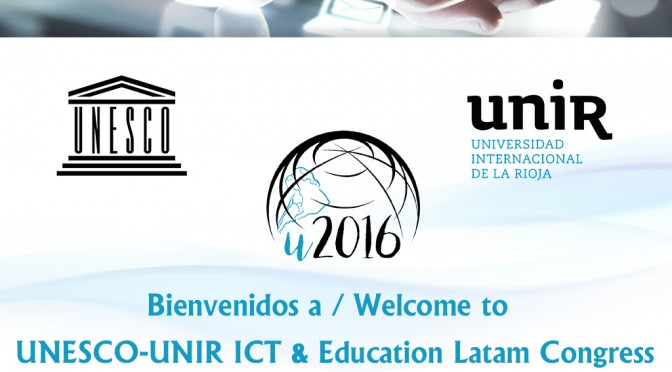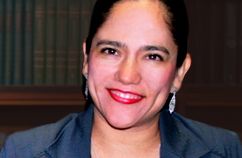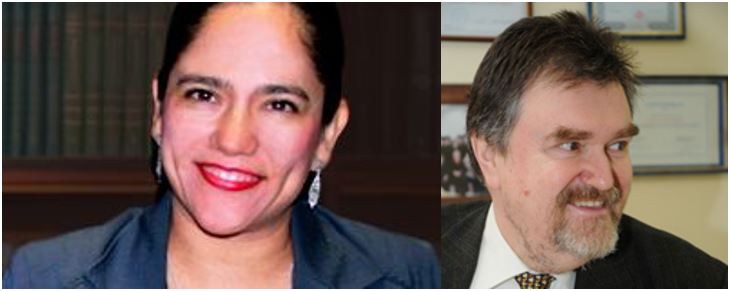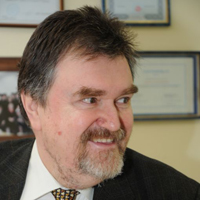Online access to the Congress:
UNESCO-UNIR ICT & Education LATAM Congress 2016
Link to the virtual workspace: http://unir.adobeconnect.com/unirresearch3

Link to the virtual workspace: http://unir.adobeconnect.com/unirresearch3

We are pleased to announce that Prof. Alexander Khoroshilov and Prof. María Soledad Ramírez Montoya, Keynote Speakers at UNESCO-UNIR ICT & Education Latam Congress 2016 (http://www.unesco-unir-latam.org).
Both are well-known worldwide as experts in Educational Technology and Innovation, and both are members of the most influential organizations in the field.

Alexander Khoroshilov is the Officer-in-Charge for UNESCO IITE (Institute for Information Technologies in Education, Moscow, Russia). He holds a PhD and is a well-known scientist and specialist on ICTs, mathematical modeling and statistics. He has over 40 years of deep professional experience in the field of ICTs and education (strategic development and management, capacity building and professional development, coordination of scientific-educational projects) including that at the international level.
María Soledad Ramírez Montoya is the director of the UNESCO Chair “Open Educational Movement for Latin America”, director of the International Council for Open of Distance Education (ICDE): OER Latin America office, lead researcher on the Strengthening Information Society Research Capacity Alliance (SIRCA) network, main organizer of the Regional Open Latin American Network for Social Research and Education (CLARISE) and coordinator of the Research and Innovation in Education Group (GIIE) at Tecnológico de Monterrey.

Prof. Dr. Alexander Khoroshilov is the Head a.i. of the UNESCO IITE. He holds a PhD and is a well-known scientist and specialist on ICTs, mathematical modeling and statistics. He has over 40 years of deep professional experience in the field of ICTs and education (strategic development and management, capacity building and professional development, coordination of scientific-educational projects) including that at the international level.
He was graduated from Moscow State University of Economics, Statistics and Informatics (MESI) in 1975, where he then worked until 2007 on various positions – from software engineer to First Vice-Rector. In the period from 2007 to 2010 he worked at Academy of Labor and Social Relations as Vice-Rector and at Moscow State (Lomonosov) University as professor. Since August 2010 he has been working at UNESCO Institute for Information Technology in Education (IITE) on the position of National Programme Officer responsible for teachers’ professional development based on ICT, OER and ICT competency standards as well as for networking and partnership with public and private sectors. Since December 2014 Professor Khoroshilov is Officer-In-Charge of IITE.
“Reaching Targets of Education-2030. UNESCO Approach and IITE Activities”.
A generic UNESCO approach for achieving the UN Sustainable Development Goal 4 in the field of education – Ensure inclusive and equitable quality education and promote lifelong learning opportunities for all’ as well as appropriate targets which are detailed in UNESCO Framework for Action “Education 2030” will be presented in the context of impact of Information and Communication Technologies (ICT). ICT can contribute to universal access to education, equity in education, the delivery of quality learning and teaching, teachers’ professional development and more efficient education management, governance and administration.
UNESCO takes a holistic and comprehensive approach to promoting ICT in education. Access, inclusion and quality are among the main challenges they can address. ICT are very important by themselves but they must be tools to empower girls and boys, women and men, to provide equality, justice and dignity for all citizens of Inclusive Knowledge Societies.
To ensure that ICT must be integrated with curricula, learning environments, teacher professional development, educational resources and with pedagogy at whole. IITE as UNESCO Category 1 Institute fully responsible for ICT in education activities in UNESCO ecosystem has a nudge experience in the field of ICT-integrated pedagogy and teacher professional development based on ICT-competency models.
The main challenges of ICT-integrative pedagogy and a review of IITE best practice based on the cooperation with other UNESCO entities, Global UNESCO Networks and its partners from public and private sectors will be presented as well, along with information regarding Institute latest activities and plans.